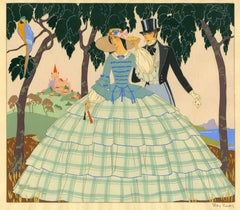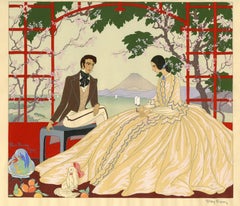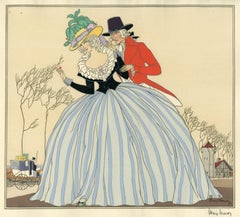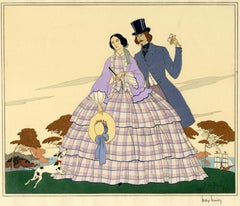Want more images or videos?
Request additional images or videos from the seller
1 of 5
Victor Max NinonEn Espagne1925
1925
$550List Price
About the Item
- Creator:Victor Max Ninon (1896-1982, Italian)
- Creation Year:1925
- Dimensions:Height: 11.5 in (29.21 cm)Width: 13 in (33.02 cm)
- Medium:
- Movement & Style:
- Period:
- Condition:Never matted or framed Original condition.
- Gallery Location:Fairlawn, OH
- Reference Number:Seller: FA60051stDibs: LU14013243752
About the Seller
5.0
Recognized Seller
These prestigious sellers are industry leaders and represent the highest echelon for item quality and design.
Gold Seller
Premium sellers maintaining a 4.3+ rating and 24-hour response times
Established in 1978
1stDibs seller since 2013
828 sales on 1stDibs
Associations
International Fine Print Dealers Association
Authenticity Guarantee
In the unlikely event there’s an issue with an item’s authenticity, contact us within 1 year for a full refund. DetailsMoney-Back Guarantee
If your item is not as described, is damaged in transit, or does not arrive, contact us within 7 days for a full refund. Details24-Hour Cancellation
You have a 24-hour grace period in which to reconsider your purchase, with no questions asked.Vetted Professional Sellers
Our world-class sellers must adhere to strict standards for service and quality, maintaining the integrity of our listings.Price-Match Guarantee
If you find that a seller listed the same item for a lower price elsewhere, we’ll match it.Trusted Global Delivery
Our best-in-class carrier network provides specialized shipping options worldwide, including custom delivery.You May Also Like
Cycles Motos Alcyon.
Located in London, GB
GAMY and MONTAUT, Ernest.
Cycles Motos Alcyon.
[Paris: Mabileau & Co., c. 1914].
Hand-coloured pochoir print. Framed and glazed, overall size: 93.6cm x 49.2cm.
The Gamy-Montaut ...
Category
1910s Art Deco Figurative Prints
Materials
Screen, Stencil
La Voiture Th. Schneider, Car - 1912
Located in London, GB
GAMY and MONTAUT, Ernest.
La Voiture Th. Schneider, 1912 gagne à Dieppe Dinant et à la Sarthe vitesse et régularité / Magneto Bosch Corburateur Claudel Roues Riley.
Mabileau & Co., ...
Category
1910s Art Deco Figurative Prints
Materials
Screen, Stencil
Stepping Out, Art Deco Screenprint by Robin Morris
By Robin Morris
Located in Long Island City, NY
Stepping Out
Robin Morris, American
Screenprint, signed and numbered in pencil
Edition of 77/150
Image Size: 45.5 x 31 inches
Frame Size: 59 x 44 inches
Category
1980s Art Deco Figurative Prints
Materials
Screen
Twin Sisters, Signed Art Deco Screenprint by Erte
By Erte - Romain de Tirtoff
Located in Long Island City, NY
Twin Sisters
Erté, Russian (1892–1990)
Date: 1982
Screenprint, signed and numbered in pencil
Edition of 350, AP
Size: 36 x 48 in. (91.44 x 121.92 cm)
Category
1980s Art Deco Figurative Prints
Materials
Screen
$4,850
H 36 in W 48 in
The Dance, Art Deco Screenprint by Robin Morris
By Robin Morris
Located in Long Island City, NY
The Dance
Robin Morris, American
Date: circa 1980
Screenprint, signed and numbered in pencil
Edition of AP
Size: 19.5 x 28.5 in. (49.53 x 72.39 cm)
Frame Siz...
Category
1980s Art Deco Figurative Prints
Materials
Screen
The Big Band, Art Deco Screenprint by Giancarlo Impiglia
By Giancarlo Impiglia
Located in Long Island City, NY
Giancarlo Impiglia, Italian/American (1940 - ) - The Big Band, Year: 1987, Medium: Screenprint, signed and numbered in pencil, Edition: 57/300, Size: 31 ...
Category
1980s Art Deco Figurative Prints
Materials
Screen
$2,800
H 42 in W 37.5 in
Summer Breeze, Signed Art Deco Screenprint by Erté
By Erté
Located in Long Island City, NY
Artist: Erte
Title: Summer Breeze
Year: circa 1982
Medium: Serigraph, Signed and Numbered in Pencil
Edition: 197/300
Image Size: 26.5 x 19 inches
Size: 30.5 in. x 23 in. (77.47 cm x ...
Category
1980s Art Deco Figurative Prints
Materials
Screen
$4,250
H 41.75 in W 33.25 in D 1 in
The Dancer, Signed Art Deco Screenprint by Erté
By Erté
Located in Long Island City, NY
Artist: Erte, Russian (1892 - 1989)
Title: The Dancer from the At the Theatre Suite
Year: 1983
Medium: Screenprint, signed and numbered in pencil
Edition: 165/300
Image Size: 22 x 16...
Category
1980s Art Deco Figurative Prints
Materials
Screen
A Toast, Art Deco Screenprint by Giancarlo Impiglia
By Giancarlo Impiglia
Located in Long Island City, NY
Artist: Giancarlo Impiglia
Title: A Toast
Year: 1981
Medium: Screenprint
Paper Size: 26 x 22.5 inches
Frame: 28 x 24.5 inches
An unsigned example aside from the edition of 300.
Category
1980s Art Deco Figurative Prints
Materials
Screen
Maestro, Art Deco Screenprint by Robin Morris
By Robin Morris
Located in Long Island City, NY
Robin Morris, American (1953 - ) - Maestro, Medium: Screenprint on Arches, signed and numbered in pencil, artist blind stamp lower right, Edition: 13/100, Image Size: 35 x 25 inches,...
Category
Late 20th Century Art Deco Figurative Prints
Materials
Screen
More From This Seller
View AllEn Espagne
By Victor Max Ninon
Located in Fairlawn, OH
En Espagne
Pochoir (silk screen) printed in colors
Signed by the artist in pencil lower right
The artist won a gold medal in Paris in 1925 for his pochoirs
Condition: Excellent
Image...
Category
1920s Art Deco Figurative Prints
Materials
Screen
Au Japon
By Victor Max Ninon
Located in Fairlawn, OH
Au Japon
Pochoir (Stencil Print), 1925
Signed by the artist in pencil lower right (see photo)
Signed in the image lower left (see photo)
Stamped verso: Made in France
Note: The artis...
Category
1920s Art Deco Figurative Prints
Materials
Screen
Robe Grise
By Victor Max Ninon
Located in Fairlawn, OH
Robe Grise
Pochoir (silk screen) printed in colors, 1923
Signed by the artist in pencil lower right (see photo)
The artist won a gold medal in Paris in 1925 for his pochoirs
Condition: Two spots in the upper left corner associated with the printing.
Victor Max Ninon (Vittorio Accornero de Testa, Italian, 1896-1982)
Biography
Vittorio Accornero de Testa was born in Casale Monferrato in 1896. He completed his first studies at the "Leardi" institute, but was forced to interrupt them due to the war events of the First World War . At 19 he was second lieutenant of the Alpine troops and in 1916 he took one of the first pilot's licenses. During the war he knows the bitterness of shooting down in air combat (for which he is decorated), but also the good fortune to stay alive, albeit with a disability. His art blossomed in the postwar period, first signing his works simply Ninon and then, probably at the suggestion of a French publisher, under the pseudonym of "Victor Max Ninon" (Victor and Max indicate strength and masculinity, Ninon boyhood) .In 1919 and 1924 he made illustrations for theGiornalino della Domenica , also together with his first wife Edina Altara , for Ardita and La Lettura . In 1923 he won the cover competition organized by the magazine El Hogar of Buenos Aires and in 1925 with his pochoirs he imposed himself in Paris at the international exhibition of modern decorative and industrial arts , obtaining a gold medal. In the same year he made two covers for the US magazine The Smart Set . In the 1920s he made numerous series of art deco style postcards for the Milanese publishing house Degami . On June 4, 1929, aGenoa embarks on the Conte Grande together with his wife Edina Altara , for New York . The two stayed in the American metropolis for a few months: in this period Accornero worked on the creation of theatrical sets and created some covers for Country Life magazine . Accornero gets awards and prizes, but the great economic crisis of the time and the nostalgia for Italy convince the two to return to their homeland, where they resume their activity as illustrators.
In 1934 Accornero moved to Milan, separated amicably from his wife and continued to dedicate himself to the illustration of children's books, abandoning the pseudonym Victor Max Ninon. It illustrates about 60 books, from the fables of Andersen , Perrault and Grimm , to the tales of Poe , as well as the famous Pinocchio and Cuore published by Mondadori, Mursia, Hoepli, Martello. Several books illustrated by Accornero have been published in French, Spanish, German and English. In addition to the periodicals already mentioned, he collaborates on the first edition of the Encyclopedia of Boys , Mondadori, and with the Italian magazines Lidel , Il Secolo XX, The Italian Illustration , Fantasies of Italy , The Woman , Cordelia , For You Lady , Grace , Metropolis , La Domenica del Corriere , The Corriere dei Piccoli .
In 1936 enters the world of cinema, creating sets and costumes for Wedding Vagabonde of Guido Brignone and The White Squadron of Augustus Genina . From 1935 to 1950 he also devoted himself to the theater, taking care of sets and costumes for numerous operettas, ballets and performances at the Scala in Milan and for the Milanese theaters Manzoni, Lirico and Olympia. Stages Marcello di Giordano, Nina pazza d'amore by Paisiello, I cantori di Nurimberga by Wagner, La Bohème by Puccini and other works. For this activity he is also cited in the Theater encyclopedia.
In the 1940s and 1950s he wrote and illustrated six books for children for Mondadori: Tomaso (1944), Giacomino (1949), Tomaso Cacciatore (1950), Zio Stefano (1950), In Campagna che delizia! (1953), Tomaso, dear Tomaso (1955). His illustrations of Perrault's Tales published in those years by Hoepli are famous.
His art in the fifties evolves towards hyperrealism . There are many personal exhibitions in Italy and abroad, including those at the Gallerie Gussoni (1959) and Bolzani (1963 and 1966) in Milan and Walcheturm (1962) in Zurich. Eminent critics praise his work, from Orio Vergani to Enrico Piceni, from Reto Roedel to De Chirico himself. On the Domenica del Corriere , the journalist, writer and painter Dino...
Category
1920s Art Deco Figurative Prints
Materials
Stencil
Coquette
By Victor Max Ninon
Located in Fairlawn, OH
Coquette
Pochoir (silk screen) printed in colors, c. 1923-1925
Signed by the artist in pencil lower right; numbered in ink on the image, (see photo)
Edition: 250 (100/250) in pencil in image (see photo)
Image size: 10-1/2 x 12-3/4"
The artist won a gold medal in Paris in 1925 for his porchoirs
Victor Max Ninon (Vittorio Accornero de Testa, Italian, 1896-1982)
Biography
Vittorio Accornero de Testa was born in Casale Monferrato in 1896. He completed his first studies at the "Leardi" institute, but was forced to interrupt them due to the war events of the First World War . At 19 he was second lieutenant of the Alpine troops and in 1916 he took one of the first pilot's licenses. During the war he knows the bitterness of shooting down in air combat (for which he is decorated), but also the good fortune to stay alive, albeit with a disability. His art blossomed in the postwar period, first signing his works simply Ninon and then, probably at the suggestion of a French publisher, under the pseudonym of "Victor Max Ninon" (Victor and Max indicate strength and masculinity, Ninon boyhood) .In 1919 and 1924 he made illustrations for theGiornalino della Domenica , also together with his first wife Edina Altara , for Ardita and La Lettura . In 1923 he won the cover competition organized by the magazine El Hogar of Buenos Aires and in 1925 with his pochoirs he imposed himself in Paris at the international exhibition of modern decorative and industrial arts , obtaining a gold medal. In the same year he made two covers for the US magazine The Smart Set . In the 1920s he made numerous series of art deco style postcards for the Milanese publishing house Degami . On June 4, 1929, aGenoa embarks on the Conte Grande together with his wife Edina Altara , for New York . The two stayed in the American metropolis for a few months: in this period Accornero worked on the creation of theatrical sets and created some covers for Country Life magazine . Accornero gets awards and prizes, but the great economic crisis of the time and the nostalgia for Italy convince the two to return to their homeland, where they resume their activity as illustrators.
In 1934 Accornero moved to Milan, separated amicably from his wife and continued to dedicate himself to the illustration of children's books, abandoning the pseudonym Victor Max Ninon. It illustrates about 60 books, from the fables of Andersen , Perrault and Grimm , to the tales of Poe , as well as the famous Pinocchio and Cuore published by Mondadori, Mursia, Hoepli, Martello. Several books illustrated by Accornero have been published in French, Spanish, German and English. In addition to the periodicals already mentioned, he collaborates on the first edition of the Encyclopedia of Boys , Mondadori, and with the Italian magazines Lidel , Il Secolo XX, The Italian Illustration , Fantasies of Italy , The Woman , Cordelia , For You Lady , Grace , Metropolis , La Domenica del Corriere , The Corriere dei Piccoli .
In 1936 enters the world of cinema, creating sets and costumes for Wedding Vagabonde of Guido Brignone and The White Squadron of Augustus Genina . From 1935 to 1950 he also devoted himself to the theater, taking care of sets and costumes for numerous operettas, ballets and performances at the Scala in Milan and for the Milanese theaters Manzoni, Lirico and Olympia. Stages Marcello di Giordano, Nina pazza d'amore by Paisiello, I cantori di Nurimberga by Wagner, La Bohème by Puccini and other works. For this activity he is also cited in the Theater encyclopedia.
In the 1940s and 1950s he wrote and illustrated six books for children for Mondadori: Tomaso (1944), Giacomino (1949), Tomaso Cacciatore (1950), Zio Stefano (1950), In Campagna che delizia! (1953), Tomaso, dear Tomaso (1955). His illustrations of Perrault's Tales published in those years by Hoepli are famous.
His art in the fifties evolves towards hyperrealism . There are many personal exhibitions in Italy and abroad, including those at the Gallerie Gussoni (1959) and Bolzani (1963 and 1966) in Milan and Walcheturm (1962) in Zurich. Eminent critics praise his work, from Orio Vergani to Enrico Piceni, from Reto Roedel to De Chirico himself. On the Domenica del Corriere , the journalist, writer and painter Dino Buzzati...
Category
1920s Art Deco Figurative Prints
Materials
Stencil
Shoe Box (Title Page)
By Allen Jones
Located in Fairlawn, OH
Shoe Box (Title Page)
From: Shoe Box-Exotic (Sculpture and seven original lithographs)
Published by the artist and Peterssburg Press
Edition: 200 of which t...
Category
1960s Pop Art Figurative Prints
Materials
Screen
In Search of New Beginnings 3
By Darius Steward
Located in Fairlawn, OH
In Search of New Beginnings 3
Puff pigment screen print with hand coloring, 2021
Signed with the artist's initials in the lower right corner (see photo)
Titled in the lower left corn...
Category
2010s Contemporary Figurative Prints
Materials
Screen



